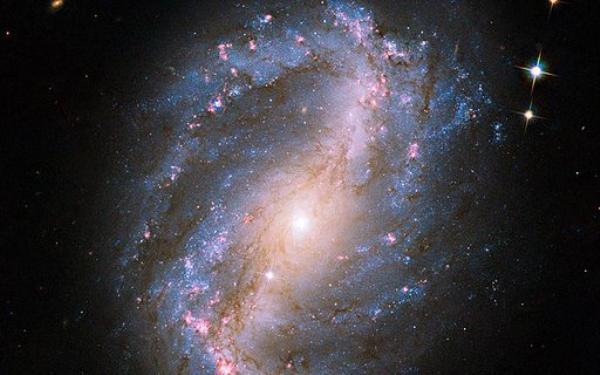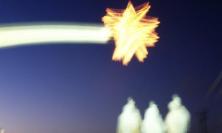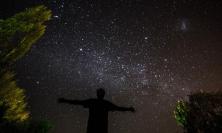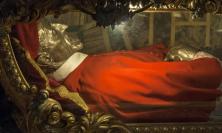‘Why does the Vatican have an observatory? Aren’t there more important things to do than look at the stars?’ Vatican astronomer Guy Consolmagno SJ has been asked these questions many times; indeed, he asks them of himself. At an event hosted by the Mount Street Jesuit Centre last month, he explained how he encounters God in his scientific studies.
I once caused a stir in a church in Hawaii by announcing that I was ‘an observer from the Vatican.’ Indeed, I am. As it happens, I was in Hawaii to use the telescopes there, just as I also observe with the Vatican’s own telescope in Arizona. That is my job with the Vatican Observatory.
Why does the Vatican have an observatory? Aren’t there more important things to do than look at the stars? That is a question not only for the Church, but for the person who chooses to do astronomy for a living. I recall when I was thirty years old, a postdoctoral fellow at MIT, I would lie in bed at 3am wondering, ‘why am I wasting my time worrying about the moons of Jupiter when there are people starving in the world?’
I had no answer.
Eventually I quit my job, I quit science and I joined the US Peace Corps. I told the Peace Corps people, ‘I’ll go anywhere you ask me to go, I’ll do anything you ask me to do; I just want to help people.’ They sent me to Africa, to Kenya... where I ended up teaching astronomy to graduate students at the University of Nairobi!
Now, we all know that there are lots of problems with a technological society like ours in the West… pollution, consumerism, the alienation of people from nature. These are real problems we all have to deal with. But for all its real problems, a technologically sophisticated society is the only kind we have been able to develop so far that is capable of feeding its people on a regular basis. To have such a society you need an educated populace; you need schools. Schools need teachers. The graduate students I was teaching had jobs waiting at the Kenya Science Teachers’ College, to teach the teachers to teach the students so that one day Kenya could better feed its population.
But that is not why they wanted to learn astronomy.
At the weekends, I would go to visit my fellow Peace Corps volunteers at the schools elsewhere in the country where they were teaching. In the evenings I would set up a little telescope I had brought with me, and everyone in the village would come out to look through the telescope. And they would go, ‘wow’ when they saw the rings of Saturn, the Orion nebula, the craters on the Moon… exactly like my family and friends back in Michigan. Everyone who has ever looked through a telescope goes ‘wow’ at those things. Looking at the stars and wondering what they are about and how we fit in – that is something that makes us human.
The astronomy we do, from landing on Mars to discovering Dark Energy, is something that every human being alive can take pride in. And to deny someone that pride because they were born on the wrong continent, or of the wrong gender or socio-economic group, is to deny them their humanity. But to remind them that you, too, can look through a telescope and go ‘wow’, and dream? That means that you, too, are a part of this big community that is more than just a bunch of people looking for bread. We do not live by bread alone. Astronomy is how we experience the universe as creatures who are interested in more than just, ‘what’s for lunch?’
But what I have also come to see is that belief plays a fundamental role in being able to do that astronomy.
There are three religious beliefs that you have to accept on faith before you can be a scientist. You may not think of them as religious, but I can name religions that do not have these beliefs.
The first thing you must believe is that this universe actually exists. This may seem obvious; but if you believe, as some religions do, that ‘everything is illusion,’ then what is there for a scientist to study? If you were a solipsist, then being a scientist would be just wasting your time studying a figment of your imagination.
The second thing to believe is that the universe operates by regular laws. How can you go searching for the physical laws of the universe if you do not believe there are physical laws to be found? Today we have a thousand years of finding those laws and seeing how we can use them to make the telephones work; but who was the first person a thousand years ago to think that such laws exist, and that they could be discovered? Where did he or she get the faith to believe that there might be laws to be found?
If you were a pagan Roman and you saw lightning strike, you said the god of lightning threw it; if you saw crops grow, you attributed that to the goddess of crops. If you believe that everything that occurs in the universe is the result of the whims of demons and deities, there is no point in looking for scientific laws.
Christians in Roman times were accused of being atheists, because they refused to believe in these pagan gods. And rightly so; there are many gods I do not believe in. Indeed, even Richard Dawkins only believes in one fewer God than I do!
And the God I believe in is not of the universe, but existed before the universe began; not a part of nature, but super-natural. If you believe in that kind of God, then there is room to ask how the rest of the world works, and room to wonder if it works by regular laws. We know from scripture that God is responsible for the universe, in a step-by- step manner. Genesis outlines a creation story that is fundamentally different from the Babylonian story in that rather than the physical universe being an accident, Genesis tells us that God deliberately willed it to exist.
And here is the third thing you have to believe as a scientist: you have to believe that the universe is good. We get that, again, from Genesis. If you think the universe is a morass of temptations, then you will be afraid to be too involved in it; you will want to meditate yourself to a higher level, perhaps. If you believe that, you are not going to want to be a scientist. But instead, we believe in a God who so loved the universe that He sent His only Son...
So why do people think that there is a conflict between science and religion? Too often the assumption is that science and religion are systems of epistemology, ways of knowing facts. Science gives me one set of facts, religion gives me another set of facts, and so surely there is going to be a time when the two systems conflict.
But that is not what science is at all, and not what religion is at all.
We all learn science in school, where it is taught as a big book of facts; and you had better use this year’s book, because last year’s book of facts is out of date. But that should immediately tell you that science is not just facts. Science continues even as the facts change. What we do in science is learn how to have a conversation about those facts… how we can talk about understanding how the universe we have observed seems to work, and how we can use that understanding to guess the next place to look. Science is not the facts, it is the conversation.
In the same way, faith is not about a bunch of things I must accept, blindly, closing my eyes to the truth. On the contrary, remember what Moses says to his people after giving the Tablets of the Law: ‘do not forget the things your eyes have seen or let them fade from your heart as long as you live. Teach them to your children and to their children after them.’ (Deut 4: 9) It is not, ‘close your eyes’ but rather, ‘pay attention to what you have seen.’
Faith is not accepting a bunch of facts in the absence of evidence. It is making choices in the absence of all the facts… whether it is your choice of school, or job, who you will marry, where you will live. When you made those choices, there was no way you could know how it would turn out. That’s life, making choices in the absence of sufficient data. But you make these choices in the expectation that things will turn out well. That’s faith. Sometimes that expectation is going to be shattered, but you go ahead anyway; what else can you do?
These expectations based on faith occur in science all the time. When I choose what field of science to enter, I am assuming that it is going to be interesting down the line; if I knew what I was going to discover, I would not have to do the science. When I see an interesting problem to chew on, I have to guess what approach is going to be the most fruitful. How do I make that decision? Of all the different approaches that are possible I only have time to try one or two; how do I choose? It is a blind step into the unknown.
Science is not a big book of facts. Science is not about ‘proving’ anything. Science describes, but the descriptions are incomplete; we keep hoping that they get better. For that very reason you cannot use science to prove the existence of God (or no-God). But can science encourage us in our belief?
One trait of God I find is that He always gives us ‘plausible deniability.’ Every time you see His action in the universe, you can always come up with some way to explain it away if you want to. It could just be coincidence, or an illusion. You can never know for sure; that, of course, is why we need faith.
But postulating a ‘God’ helps us deal with certain classic mysteries of the fundamental nature of our existence. Leibniz once famously asked, ‘Why is there something instead of nothing?’ The ‘nothing’ of ‘creation from nothing’ is more than the absence of matter; it is the absence of space, time and the laws of physics themselves. Why is there a universe? The universe itself cannot explain itself. Either it has no explanation, which is certainly possible; or there is a reason for its existence, outside of itself, and we will identify that reason with God.
But in my science I encounter not only the creator God, but also a personal God. And to explain that, let me tell one final story.
I recall rainy summer afternoons when I was a child; when I couldn’t go outside to play, my mother would bring out a deck of cards and deal out a hand. Now, she is an adult, I am a child; there is no question that she could win the game at any time she wanted to. But the point of this game was not to win. The point of this game was for her to tell me she loves me. She could not say it out loud; no ten-year-old boy would stand for that. But she could show it, by spending time with me, by sharing the enjoyment of the game.
When I do science, God is playing a game with me. He sets the puzzles, I play out the puzzles; and like all puzzles, it is not the answers that matter, it is activity of finding the answers. The answers only count if they can then set up the next puzzle.
Science is where I get to spend time with the Creator. When God invites me to encounter him in the things that have been made, as St. Paul puts it in his letter to the Romans, God is setting up a game we get to play together. It is a game that, on top of everything else, tells me He loves me.
And for that, I am grateful to be an astronomer.
Br Guy Consolmagno SJ is an astronomer at the Vatican Observatory.
This is an edited version of a talk that was delivered at the Mount Street Jesuit Centre in Central London on 18 March 2013.
![]() Listen to Brother Guy talking about life in the Vatican, what his work actually entails, faith and science, and his own personal story on Premier Heart to Heart
Listen to Brother Guy talking about life in the Vatican, what his work actually entails, faith and science, and his own personal story on Premier Heart to Heart
![]() Mount Street Jesuit Centre
Mount Street Jesuit Centre






